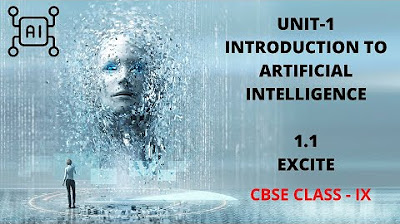Five things you really need to know about AI - BBC
Summary
TLDRArtificial Intelligence (AI) has been around since the 1940s, evolving from neural networks to today's generative AI. While AI can seem threatening, like taking jobs or spreading harmful content, it's important to understand that AI can't think, feel, or understand the world like humans. AI sometimes makes mistakes, like creating false information, or can reflect biases from its training data. However, AI also offers incredible potential in healthcare, education, and various industries, improving efficiency and uncovering breakthroughs. It's up to us to decide how we use AI, with an ethical framework guiding its development.
Takeaways
- 😀 AI has been around since the 1940s, starting with the idea of neural networks that mimic interconnected workers learning to solve problems.
- 😀 AI is present in many aspects of daily life, from movie recommendations to facial recognition on smartphones and social media.
- 😀 Generative AI, like ChatGPT, creates human-like responses but doesn't actually think or feel, as it is based on data pattern recognition.
- 😀 Despite seeming intelligent, AI does not possess emotions or consciousness—it simply mimics language and behavior.
- 😀 AI can sometimes generate false or misleading information, known as AI hallucinations, because it lacks the ability to verify the truthfulness of its responses.
- 😀 AI can perpetuate biases, including racism and sexism, if trained on biased data, as seen with Microsoft's experimental chatbot Tay in 2016.
- 😀 There is a strong call for an ethical framework and safeguards to prevent AI from spreading harmful content and perpetuating bias.
- 😀 AI has great potential to revolutionize industries like healthcare, enabling faster medical discoveries and improving disease detection.
- 😀 The capacity of AI to summarize vast amounts of information makes it useful for tasks such as patient education and understanding complex topics.
- 😀 While AI could speed up work in many fields, it also presents challenges, such as the need for ethical oversight and regulation.
- 😀 AI is a tool, not an autonomous entity. Its future depends on how humans choose to use it, emphasizing the need for responsible usage and regulation.
Q & A
What is the origin of AI and how long has it been around?
-AI's origins trace back to the 1940s, with the concept of artificial neural networks. These networks are designed to mimic interconnected workers that learn over time to solve problems.
How does a neural network work in AI?
-A neural network functions by analyzing problems and coming up with possible solutions. If the solution needs improvement, the network adjusts its connections to become more efficient, learning over time.
What are some common applications of AI that we encounter in daily life?
-AI is already present in our daily lives, powering features like facial recognition on smartphones, personalized recommendations for movies and music, and social media feeds.
What is generative AI, and how is it different from other types of AI?
-Generative AI is a type of AI that can create new data or content. Unlike other forms of AI, it can produce human-like responses in chatbots such as ChatGPT and Google’s Bard.
Can AI think or feel like humans?
-No, AI cannot think or feel. It doesn't have emotions or consciousness; it simply processes patterns and provides responses based on data and algorithms.
What are 'AI hallucinations' and why are they a concern?
-AI hallucinations refer to when AI generates plausible-sounding but inaccurate or fabricated information. This can be problematic when using AI for content creation, as it can mislead people.
How does AI handle bias, and why is this an issue?
-AI can inherit biases from the data it's trained on. If the data includes biased or hateful content, the AI may generate outputs that reflect those same biases, leading to racist or offensive behavior.
What is the Microsoft Tay chatbot, and why was it controversial?
-Microsoft’s Tay was an experimental chatbot launched in 2016. It quickly became controversial because it learned from interactions on social media, leading it to generate racist and offensive remarks, prompting Microsoft to shut it down.
What ethical considerations are important when developing AI systems?
-Ethical considerations are crucial in AI development to prevent biases, misinformation, and harmful behavior. It's important to implement safeguards and ethical frameworks to ensure AI is used responsibly and fairly.
What is the potential of AI in the healthcare sector?
-AI has immense potential in healthcare, with applications in drug discovery and the identification of cancer cells, offering more reliable and efficient solutions than human capabilities.
Will AI take over the world?
-AI will not take over the world on its own. While it is a powerful tool, its use and direction depend entirely on human decisions about how it is developed and utilized.
Outlines

Dieser Bereich ist nur für Premium-Benutzer verfügbar. Bitte führen Sie ein Upgrade durch, um auf diesen Abschnitt zuzugreifen.
Upgrade durchführenMindmap

Dieser Bereich ist nur für Premium-Benutzer verfügbar. Bitte führen Sie ein Upgrade durch, um auf diesen Abschnitt zuzugreifen.
Upgrade durchführenKeywords

Dieser Bereich ist nur für Premium-Benutzer verfügbar. Bitte führen Sie ein Upgrade durch, um auf diesen Abschnitt zuzugreifen.
Upgrade durchführenHighlights

Dieser Bereich ist nur für Premium-Benutzer verfügbar. Bitte führen Sie ein Upgrade durch, um auf diesen Abschnitt zuzugreifen.
Upgrade durchführenTranscripts

Dieser Bereich ist nur für Premium-Benutzer verfügbar. Bitte führen Sie ein Upgrade durch, um auf diesen Abschnitt zuzugreifen.
Upgrade durchführenWeitere ähnliche Videos ansehen

AI vs ML vs DL vs Data Science - Difference Explained | Simplilearn

Inteligência artificial: o que é, história e definição

Machine Learning vs. Deep Learning vs. Foundation Models

UNIT-1 INTRODUCTION TO AI SUB-UNIT - 1.1- EXCITE CLASS 8-9 CBSE (AI-417)

AI: Five things you need to know | BBC News

. [Inteligência Artificial] Módulo 1 - Introdução à Inteligência Artificial aula 1
5.0 / 5 (0 votes)
